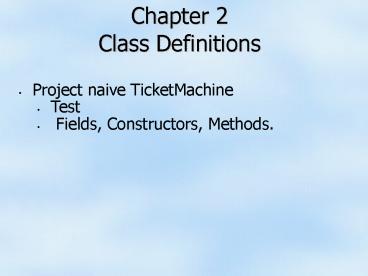Chapter 2 Class Definitions PowerPoint PPT Presentation
1 / 9
Title: Chapter 2 Class Definitions
1
Chapter 2Class Definitions
- Project naive TicketMachine
- Test
- Fields, Constructors, Methods.
2
Fields, Constructors, Methods
- Fields
- Define data to be stored in an object, i.e. the
state of the object - Specified as private
- Define data to be stored in an object, i.e. the
state of the object - Usually come at the beginning of the class
definition - NOT defined inside a method.
3
Fields, Constructors, Methods
- Constructors
- Same name as the class
- No return type, not even void
- Automatically called when an object of the class
is created - Usually used to initialize values of the fields
- Usually come after the field definitions, but
before the methods.
4
Fields, Constructors, Methods
- Methods
- Define the object's behavior
- May specify a return type, or void
- May have parameters, separated by commas
- Must have the parentheses, even if there are no
parameters - May be public or private.
5
Passing Data Via Parameters
- Parameters
- Are used to send data into a called method
- Parameters in the calling method are actual
parameters - Parameters in the method being called are formal
parameters - Actual parameters may be expressions of the
correct type 3.5 p p/3.0 - Formal parameters must be simple variables p
- Formal parameters die when the method terminates.
6
Passing Data Via Parameters
- When a method is called from another method
- The actual parameters are evaluated
- The value of each actual parameter is copied
into the corresponding formal parameter - With primitive types (int, float, char, boolean)
this is straightforward - With object types (String, Color, ...) a
reference to the data is copied - Actual parameters and formal parameters must
agree in number and type.
7
Assignment
- Syntax
- variable expression
- Examples
- interest balance 0.05
- price ticketCost
- age 18
- age age 1
- x y
- Semantics
- The expression is evaluated
- Its value is stored into the variable
- The value assigned is the result!
8
Assignment
- Object types are different
- Circle sun
- Circle sun2
- sun new Circle()
- sun2 sun
- sun.changeColor(red)
- // sun2 is now red!
9
Expressions
- An expression may be
- A variable
- A constant
- expression expression
- expression - expression
- expression expression
- expression / expression
- ( expression )

